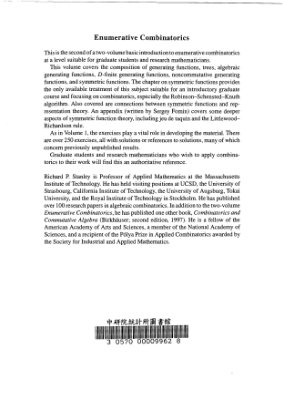Издательство Cambridge University Press, 1999, -595 pp.
This is the second of a two-volume basic introduction to enumerative combinatorics at a level suitable for graduate students and research mathematicians. This volume covers the composition of generating functions, trees, algebraic generating functions, D-finite generating functions, noncommutative generating functions, and symmetric functions. The chapter on symmetric functions provides the only available treatment of this subject suitable for an introductory graduate course and focusing on combinatorics, especially the Robinson-Schensted-Knuth algorithm. Also covered are connections between symmetric functions and representation theory. An appendix (written by Sergey Fomin) covers some deeper aspects of symmetric function theory, including jeu de taquin and the Littlewood-Richardson rule.
As in Volume 1, the exercises play a vital role in developing the material. There are over 250 exercises, all with solutions or references to solutions, many of which conce previously unpublished results.
Graduate students and research mathematicians who wish to apply combinatorics to their work will find this an authoritative reference. Richard P. Stanley is Professor of Applied Mathematics at the Massachusetts Institute of Technology. He has held visiting positions at UCSD, the University of Strasbourg, Califoia Institute of Technology, the University of Augsburg, Tokai University, and the Royal Institute of Technology in Stockholm. He has published over 100 research papers in algebraic combinatorics. In addition to the two-volume Enumerative Combinatorics, he has published one other book, Combinatorics and Commutative Algebra (Birkhauser; second edition, 1997). He is a fellow of the American Academy of Arts and Sciences, a member of the National Academy of Sciences, and a recipient of the Polya Prize in Applied Combinatorics awarded by the Society for Industrial and Applied Mathematics.
Trees and the Composition of Generating Functions.
Algebraic, D-Finite, and Noncommutative Generating Functions.
Symmetric Functions.
A1 Knuth Equivalence, Jeu de Taquin, and the Littlewood-Richardson Rule.
A2 The Characters of GL(n, C).
This is the second of a two-volume basic introduction to enumerative combinatorics at a level suitable for graduate students and research mathematicians. This volume covers the composition of generating functions, trees, algebraic generating functions, D-finite generating functions, noncommutative generating functions, and symmetric functions. The chapter on symmetric functions provides the only available treatment of this subject suitable for an introductory graduate course and focusing on combinatorics, especially the Robinson-Schensted-Knuth algorithm. Also covered are connections between symmetric functions and representation theory. An appendix (written by Sergey Fomin) covers some deeper aspects of symmetric function theory, including jeu de taquin and the Littlewood-Richardson rule.
As in Volume 1, the exercises play a vital role in developing the material. There are over 250 exercises, all with solutions or references to solutions, many of which conce previously unpublished results.
Graduate students and research mathematicians who wish to apply combinatorics to their work will find this an authoritative reference. Richard P. Stanley is Professor of Applied Mathematics at the Massachusetts Institute of Technology. He has held visiting positions at UCSD, the University of Strasbourg, Califoia Institute of Technology, the University of Augsburg, Tokai University, and the Royal Institute of Technology in Stockholm. He has published over 100 research papers in algebraic combinatorics. In addition to the two-volume Enumerative Combinatorics, he has published one other book, Combinatorics and Commutative Algebra (Birkhauser; second edition, 1997). He is a fellow of the American Academy of Arts and Sciences, a member of the National Academy of Sciences, and a recipient of the Polya Prize in Applied Combinatorics awarded by the Society for Industrial and Applied Mathematics.
Trees and the Composition of Generating Functions.
Algebraic, D-Finite, and Noncommutative Generating Functions.
Symmetric Functions.
A1 Knuth Equivalence, Jeu de Taquin, and the Littlewood-Richardson Rule.
A2 The Characters of GL(n, C).

